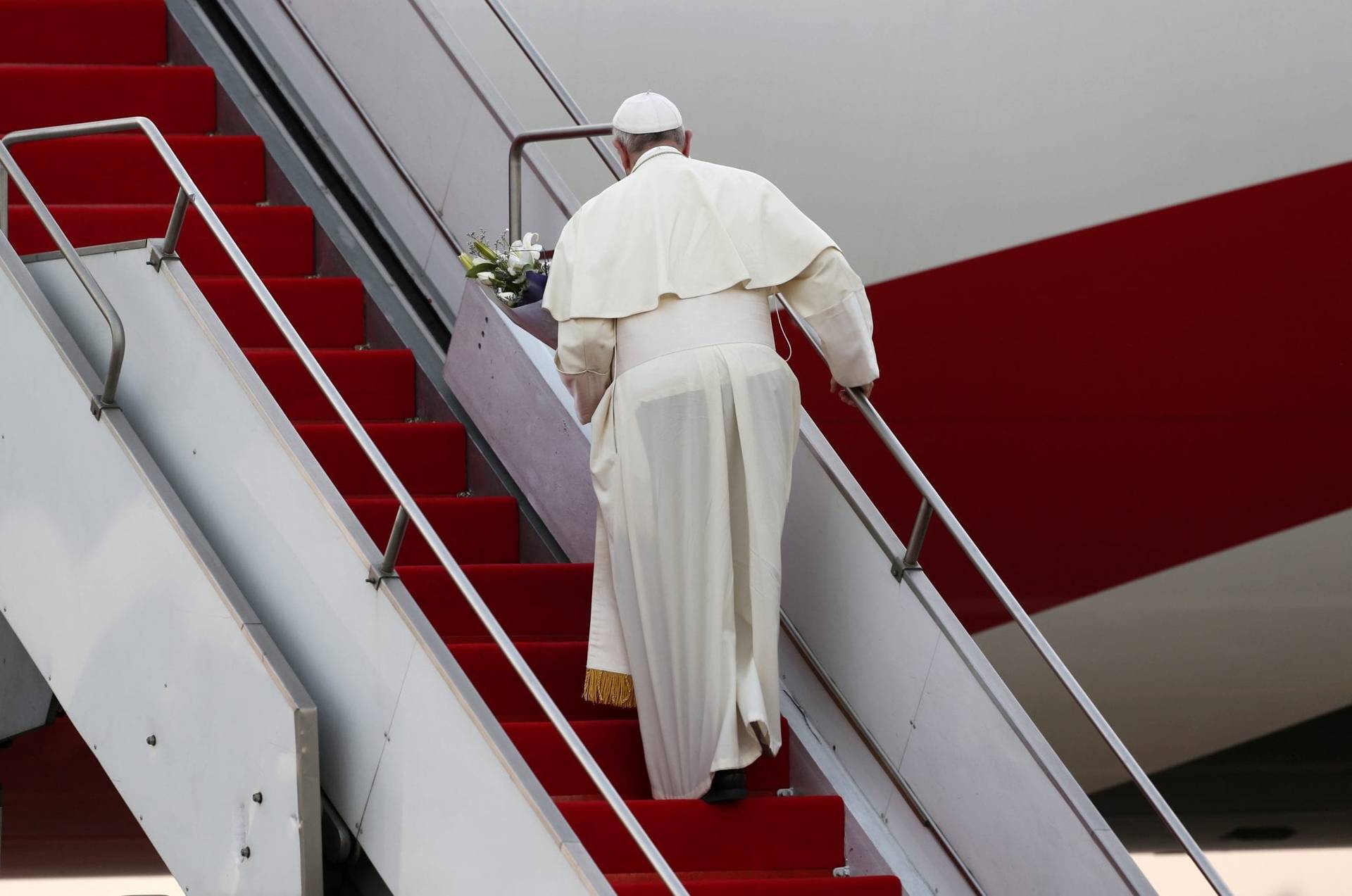YANGON, Myanmar – Pope Francis has landed in Myanmar, for what will be the first-ever papal visit to a country that is in an uphill battle to embrace democracy after six decades with a military government.
The pope’s arrival was very austere, including only the 20 Catholic bishops of the country and a group of some 200 children from parishes around Yangon. Some of the children were wearing colorful traditional outfits, while the rest had white shirts with the official logo of the visit and waved the Vatican flag, as they sang “Viva el papa.”
Denis, the woman tasked with coordinating the children, told Crux that they were all “very excited,” to be there welcoming Francis, and also for the visit as a whole. “I hope he brings us a message of peace,” a sentiment echoed by half a dozen airport personnel when they were asked about their expectations.
Francis’s visit to this majority-Buddhist nation with 52 million inhabitants has been described by observers as a political minefield, and his biggest diplomatic challenge to date. Above all, persecuted minorities, particularly the Rohingya Muslims, but also Christians, will be on his mind during the Nov. 27-30 visit.
RELATED: Pope Francis faces minefield in Myanmar over the Rohingya
Aware of the challenge the trip will present, Francis spelled out the purpose of his visit in a video-message he sent ahead of his arrival: “I come to proclaim the Gospel of Jesus Christ, a message of reconciliation, forgiveness, and peace,” he stated in “a word of friendship and greeting to all the people” of Myanmar.
Throughout his visit, he’ll encounter the local political class, including Nobel Prize laureate Aung San Suu Kyi, who became ‘state counselor’ – the de facto head of state – in the 2015 democratic vote; the head of the military; the Buddhist leadership; and a religious meeting with leaders of the other religions present in the country, that was added at the last minute.
He will also have several moments with the small Catholic community in Myanmar, saying Mass for them and encountering the local Catholic youth.
Catholics represent less than 1.4 percent of the total population. There are an estimated 700,000-faithful scattered in 16 dioceses in 14 states, and the local hierarchy is made up of 20 bishops, 800 priests, 2,400 religious sisters and 400 seminarians.
In his video message, released Nov. 17, the pope also said he was coming “to confirm the Catholic community of Myanmar in its faith in God and witness of the Gospel.”
Though much of the international attention has been focused on the Rohingya minority, particularly after 600,000 of them were forced to flee to neighboring Bangladesh since August, the situation of Christians on the ground is also precarious, despite the fact that a few years back the Church celebrated its 500 years of presence in the country.
(Francis will visit Bangladesh Nov. 30- Dec. 2, where he will meet representatives of the Rohingya.)
Speaking with Crux ahead of the visit, a member of the Rohingya community said that Christians have “no religious freedom” whatsoever, and he acknowledged he hoped the pope could address this issue, too.
“The whole of Myanmar is waiting to see with us our dear Holy Father Francis,” Cardinal Charles Muang Bo, of Myanmar, told L’Osservatore Romano, the Vatican’s newspaper on the eve of the visit. “He’ll arrive at a moment in which the country is in the news because of the migration of thousands of people. There’s a great hope that his presence touches everyone’s heart turning the country into a lasting peace.”
Foreign Christian missionaries are not allowed to introduce themselves as such, coming into the country with work visas, usually as translators or teachers. This is due to the fact that the government is afraid of proselytism. As a result, there are virtually no converts in the country, and the Church’s growth is due to growth in families.
Francis has no official activity on the agenda for Monday. The first day of his visit has been set aside mostly to rest after an 11 hour flight from Rome. However, the Vatican announced after his arrival he had rescheduled his Thursday meeting with members of the military to Monday evening, but this will be a private encounter.
He is not scheduled to deliver a speech until Tuesday afternoon, when he’ll encounter the local political leadership in the country’s capital, Nay Pyi Taw.















